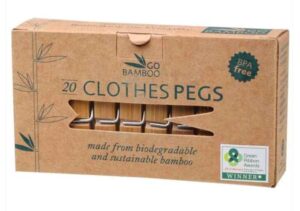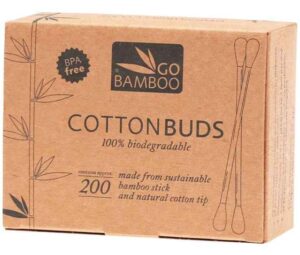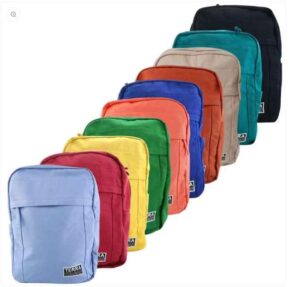Organic and Bamboo Products
The Eco-Friendly Duo: Unveiling the Benefits of Organic and Bamboo Products

In today’s world, where sustainability is of utmost importance, organic and bamboo products have emerged as the eco-friendly duo, offering numerous benefits for both consumers and the planet. From clothing and bedding to skincare and household items, these products are gaining popularity for their environmental advantages and health benefits.
Organic products are made from natural ingredients that are free from harmful chemicals and pesticides. Not only are they better for our health, but they also support sustainable farming practices, preserving soil fertility and protecting water sources.
Bamboo products, on the other hand, is a highly renewable resource that grows rapidly and requires minimal pesticides or fertilizers. It is incredibly versatile, used in everything from furniture and flooring to textiles.
The benefits of choosing organic and bamboo products are undeniable. They are biodegradable, reducing waste and pollution. They are also hypoallergenic, making them ideal for people with sensitivities. Additionally, these products are known for their durability, ensuring longevity and reducing the need for frequent replacements. By incorporating organic and bamboo products into our lives, we can make a positive impact on the environment and prioritize our health. Join the sustainable revolution and embrace the benefits of these eco-friendly alternatives.
Benefits of Organic Products
Organic products are those that are grown or produced without the use of synthetic pesticides, fertilizers, hormones, antibiotics, or genetically modified organisms. Organic products have many benefits for human health, the environment, and animal welfare. Some of the benefits are:
- Organic products are safer and more nutritious. They contain higher levels of antioxidants, vitamins, minerals, and phytochemicals that can protect against chronic diseases. They also have lower levels of harmful substances such as heavy metals, residues, and additives that can cause allergies, infections, or cancers.
- Organic products are better for the environment. They reduce soil erosion, water pollution, greenhouse gas emissions, and biodiversity loss. They also conserve natural resources such as water, energy, and land. They promote ecological balance and sustainability by enhancing soil fertility, crop rotation, and biological pest control.
- Organic products are more humane and ethical. They respect the welfare and rights of animals by providing them with natural feed, adequate space, fresh air, and access to outdoors. They also avoid the use of cruel practices such as debeaking, tail docking, or castration. They support the livelihoods and well-being of farmers and workers by ensuring fair prices, safe working conditions, and social justice.
Benefits of Bamboo Products
Bamboo products are items made from bamboo, a natural and sustainable resource that grows quickly and does not require much water or fertilizer. Bamboo products have many benefits for the environment and for your home. They are biodegradable, compostable, durable, strong, lightweight, versatile, and moisture-resistant. Bamboo products can be used for a wide range of purposes, such as furniture, flooring, kitchenware, clothing, skincare, and dental hygiene. Bamboo products also have a lower carbon footprint than other materials, making them a green and eco-friendly choice. By choosing bamboo products, you can reduce your family’s impact on the environment and enjoy high-quality products that last.
Environmental Impact of Organic and Bamboo Products
Bamboo is a versatile and renewable plant that can be used for various purposes, such as furniture, clothing, bioenergy, and construction. Bamboo products have a lower environmental impact than most alternatives made from hardwood trees or other materials. Bamboo can help fight climate change by absorbing carbon dioxide, producing oxygen, avoiding deforestation, and reducing fossil fuel use. Bamboo also has social and economic benefits for many rural communities that depend on it for income and livelihoods.
However, not all bamboo products are equally eco-friendly. Some bamboo products require intensive processing, chemical treatments, or transportation that can reduce their sustainability. Therefore, consumers should be aware of the environmental impact of different bamboo products and choose those that are certified as organic, fair trade, or low emission.
Health Benefits of Using Organic and Bamboo Products
Organic and bamboo products are becoming more popular among consumers who are looking for natural, eco-friendly and healthy alternatives to conventional products. Organic products are made from materials that are grown without the use of synthetic pesticides, fertilizers, hormones or antibiotics, which can have harmful effects on the environment and human health. Bamboo products are made from the fast-growing and renewable bamboo plant, which has many advantages over other materials such as cotton, wood or plastic. Some of the health benefits of using organic and bamboo products are:
- Organic and bamboo products are hypoallergenic and antibacterial, which means they can prevent or reduce allergic reactions, skin irritations, infections and odours caused by bacteria, fungi or dust mites. This is especially beneficial for people with sensitive skin, asthma, allergies or eczema.
- Organic and bamboo products are breathable and moisture-wicking, which means they can regulate body temperature and keep the skin dry and comfortable. This can help prevent overheating, sweating, chafing and rashes, as well as improve sleep quality and mood.
- Organic and bamboo products are soft and durable, which means they can provide comfort and support for the body without causing friction or pressure points. This can help prevent muscle soreness, joint pain, headaches and neck stiffness, as well as improve blood circulation and posture.
- Organic and bamboo products are biodegradable and compostable, which means they can reduce waste and pollution in landfills and oceans. This can help preserve the natural resources and biodiversity of the planet, as well as protect human health from exposure to toxic chemicals and microplastics.
How to Choose Organic and Bamboo Products
Organic and bamboo products are becoming more popular as people seek to reduce their environmental impact and support sustainable practices. However, not all products labelled as organic or bamboo are truly eco-friendly or ethical. Here are some tips on how to choose organic and bamboo products that are good for you and the planet.
- Look for certified labels. The most reliable way to ensure that a product is organic or bamboo is to check for a certification label from a reputable organization, such as the USDA Organic, the Global Organic Textile Standard (GOTS), the Organic Content Standard (OCS), or the Organic Bamboo Certification (OBC). These labels indicate that the product meets certain criteria for organic farming, processing, and manufacturing, and that it has been verified by a third-party auditor.
- Check the ingredients. Some products may claim to be organic or bamboo, but only contain a small percentage of these materials, while the rest are synthetic or conventional. For example, a product may be labelled as “bamboo viscose” or “bamboo rayon”, but actually be made from chemically processed bamboo pulp that is mixed with other fibres. To avoid greenwashing, look for products that are made from 100% organic or bamboo materials, or at least have a high percentage of them.
- Consider the durability and quality. Organic and bamboo products tend to be more durable and higher quality than conventional ones, because they are made from natural fibres that are less prone to wear and tear, fading, or shrinking. They also tend to be softer, more breathable, and more comfortable than synthetic or conventional fabrics. However, some organic and bamboo products may be poorly made or have low-quality stitching, seams, or zippers. To avoid wasting money and resources, look for products that have good reviews, ratings, or feedback from previous customers, or that offer a warranty or guarantee.
- Compare the prices and value. Organic and bamboo products may be more expensive than conventional ones, because they require more labour, time, and resources to produce. However, this does not mean that they are always overpriced or unaffordable. In fact, some organic and bamboo products may offer better value than conventional ones, because they last longer, perform better, and have fewer negative impacts on the environment and human health. To make an informed decision, compare the prices and value of different products based on their quality, durability, functionality, and benefits.
Popular Organic and Bamboo Products in the Market
Bamboo is a fast-growing, renewable, and versatile plant that has many applications in various industries. Some of the popular organic and bamboo products in the market are:
- Bamboo toothbrushes: These are eco-friendly alternatives to plastic toothbrushes that are biodegradable and gentle on the gums. Bamboo toothbrushes can help reduce plastic waste and promote oral hygiene.
- Bamboo clothing: Bamboo fabric is soft, breathable, and antibacterial, making it ideal for clothing. Bamboo clothing can range from casual wear to formal wear, and it is suitable for all seasons. Bamboo clothing can also help regulate body temperature and prevent odours.
- Bamboo bedding: Bamboo sheets, pillows, and duvets are comfortable, durable, and hypoallergenic. Bamboo bedding can provide a cosy and relaxing sleep experience, as well as protect against dust mites and allergens. Bamboo bedding can also absorb moisture and keep the bed fresh and clean.
- Bamboo water bottles: These are reusable bottles made from bamboo and stainless steel that can keep drinks hot or cold for hours. Bamboo water bottles can reduce plastic consumption and environmental impact, as well as provide a stylish and natural look.
- Bamboo furniture: Bamboo is a strong and flexible material that can be used to make furniture for indoor and outdoor use. Bamboo furniture can add a touch of elegance and warmth to any space, as well as withstand weather conditions and pests. Bamboo furniture can also be easily cleaned and maintained.
These are just some of the examples of the popular organic and bamboo products in the market that can offer many benefits for consumers and the environment. Bamboo products are gaining immense popularity among consumers who are looking for eco-friendly, sustainable, and high-quality products that can enhance their lifestyle and well-being.
Sustainable Production and Certification of Organic and Bamboo Products
Sustainable production and certification of organic and bamboo products are essential for ensuring the environmental and social benefits of these alternative materials. Organic products are grown without the use of synthetic pesticides, fertilizers, or genetically modified organisms, which can harm the soil, water, and biodiversity.
Bamboo products are made from a fast-growing and renewable plant that can sequester carbon dioxide and prevent soil erosion. However, not all organic and bamboo products are created equal. Some may still involve deforestation, land conversion, or unfair labour practices. Therefore, consumers and producers need to rely on credible certification schemes that verify the sustainability standards and practices of organic and bamboo products.
Certification can also provide market access, price premiums, and consumer trust for these products. Some examples of certification schemes for organic and bamboo products are the USDA Organic, the EU Organic, the Global Organic Textile Standard (GOTS), the Organic Content Standard (OCS), the Forest Stewardship Council (FSC), and the Programme for the Endorsement of Forest Certification (PEFC).
Transitioning to a Sustainable Lifestyle with Organic and Bamboo Products

Many people are becoming more aware of the environmental impact of their consumption habits and are looking for ways to reduce their ecological footprint. One of the ways to do this is to transition to a sustainable lifestyle with organic and bamboo products. Organic products are those that are grown or made without the use of synthetic chemicals, pesticides, fertilizers, or genetically modified organisms. Bamboo products are those that are made from bamboo, a fast-growing and renewable plant that can be used for various purposes, such as clothing, furniture, paper, and utensils.
Transitioning to a sustainable lifestyle with organic and bamboo products can have many benefits for both the individual and the planet. For the individual, organic and bamboo products can offer better health, comfort, and quality. Organic products can reduce the exposure to harmful substances that can cause allergies, irritations, or diseases. Bamboo products can provide natural antibacterial, antifungal, and deodorizing properties, as well as softness, breathability, and durability. For the planet, organic and bamboo products can help conserve natural resources, protect biodiversity, and mitigate climate change. Organic products can prevent soil erosion, water pollution, and loss of wildlife habitats. Bamboo products can sequester carbon dioxide, prevent deforestation, and generate oxygen.
Transitioning to a sustainable lifestyle with organic and bamboo products may seem challenging at first, but it can be done gradually and easily with some simple steps. Here are some tips to help you get started:
- Start with small changes. You don’t have to overhaul your entire wardrobe or household in one go. You can begin by replacing some of your everyday items with organic or bamboo alternatives, such as towels, sheets, toothbrushes, or socks.
- Do your research. Before buying any product, make sure to check its label and certification. Look for credible labels that indicate the product is organic or made from bamboo, such as USDA Organic, GOTS (Global Organic Textile Standard), or Oeko-Tex Standard 100.
- Compare prices and quality. Organic and bamboo products may seem more expensive than conventional ones at first glance, but they may actually save you money in the long run. Organic and bamboo products tend to last longer, require less maintenance, and offer better performance than conventional ones. Compare the prices and quality of different brands and products and choose the ones that suit your budget and needs.
- Support local and ethical businesses. Buying organic and bamboo products is not only good for the environment, but also for the people who produce them. By supporting local and ethical businesses, you can help create jobs, improve livelihoods, and promote fair trade practices in your community and around the world.
Conclusion to Organic and Bamboo Products
In conclusion, organic and bamboo products are a great choice for consumers who care about the environment, their health, and their comfort. Organic and bamboo products are made from natural materials that are biodegradable, renewable, and pesticide-free. They also have many benefits such as being soft, breathable, antibacterial, and hypoallergenic. Organic and bamboo products can help reduce the environmental impact of the textile industry, which is one of the most polluting and resource-intensive sectors in the world.
By choosing organic and bamboo products, consumers can support sustainable farming practices, protect wildlife habitats, and conserve water and energy. Organic and bamboo products are not only good for the planet, but also for the people who use them.


